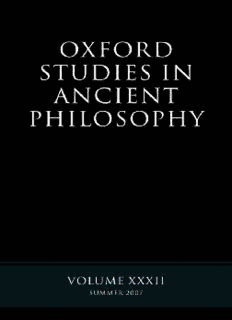Table Of ContentOXFORD STUDIES IN ANCIENT PHILOSOPHY
This page intentionally left blank
OXFORD STUDIES
IN ANCIENT
PHILOSOPHY
EDITOR: DAVID SEDLEY
VOLUME XXXII
summer 2007
(cid:1)
(cid:1)
GreatClarendonStreet,Oxfordox26dp
OxfordUniversityPressisadepartmentoftheUniversityofOxford.
ItfurtherstheUniversity’sobjectiveofexcellenceinresearch,scholarship,
andeducationbypublishingworldwidein
Oxford NewYork
Auckland CapeTown DaresSalaam HongKong Karachi
KualaLumpur Madrid Melbourne MexicoCity Nairobi
NewDelhi Shanghai Taipei Toronto
Witho¶cesin
Argentina Austria Brazil Chile CzechRepublic France Greece
Guatemala Hungary Italy Japan Poland Portugal Singapore
SouthKorea Switzerland Thailand Turkey Ukraine Vietnam
OxfordisaregisteredtrademarkofOxfordUniversityPress
intheUKandincertainothercountries
PublishedintheUnitedStates
byOxfordUniversityPressInc.,NewYork
ãExceptwhereotherwisestated,OxfordUniversityPress,2007
Themoralrightsoftheauthorshavebeenasserted
DatabaserightOxfordUniversityPress(maker)
Firstpublished2007
Allrightsreserved.Nopartofthispublicationmaybereproduced,
storedinaretrievalsystem,ortransmitted,inanyformorbyanymeans,
withoutthepriorpermissioninwritingofOxfordUniversityPress,
orasexpresslypermittedbylaw,orundertermsagreedwiththeappropriate
reprographicsrightsorganization.Enquiriesconcerningreproduction
outsidethescopeoftheaboveshouldbesenttotheRightsDepartment,
OxfordUniversityPress,attheaddressabove
Youmustnotcirculatethisbookinanyotherbindingorcover
andyoumustimposethesameconditiononanyacquirer
BritishLibraryCataloguinginPublicationData
Dataavailable
LibraryofCongressCataloginginPublicationData
Oxfordstudiesinancientphilosophy.—
Vol.xxxii(2007).—Oxford:ClarendonPress;
NewYork:OxfordUniversityPress,1983–
v.;22cm.Annual.
1.Philosophy,Ancient—Periodicals.
B1.O9 180.{5—dc.19 84–645022
AACR2 MARC-S
TypesetbyJohnWas‹,Oxford
PrintedinGreatBritain
onacid-freepaperby
BiddlesLtd,King’sLynn,Norfolk
ISBN978–0–19–922731–0
ISBN978–0–19–922738–9(Pbk.)
1 3 5 7 9 10 8 6 4 2
ADVISORY BOARD
ProfessorJonathanBarnes,Universite‹deParis-Sorbonne,ParisIV
ProfessorMichaelFrede,UniversityofAthens
ProfessorA.A.Long,UniversityofCalifornia,Berkeley
ProfessorMarthaNussbaum,UniversityofChicago
Professor Richard Sorabji, King’s College, University of London,
andWolfsonCollege,Oxford
ProfessorGiselaStriker,HarvardUniversity
Contributions and booksfor review should be sent to the Editor.
Until 30 September 2007this is Professor D. N. Sedley, Christ’s
College,Cambridgecb23bu,UK(e-maildns1Äcam.ac.uk);after
thatdateitwillbeProfessorBradInwood,DepartmentofClassics,
University of Toronto, 97 St George Street, Toronto m5s 2e8,
Canada(e-mailbrad.inwoodÄutoronto.ca).
Contributors are asked to observe the ‘Notes for Contributors to
Oxford Studies in Ancient Philosophy’,printed at the end ofthis
volume.
Up-to-date contact details, the latest version of Notes to Con-
tributors,andpublicationschedulescanbecheckedontheOxford
StudiesinAncientPhilosophywebsite:
www.oup.co.uk/philosophy/series/osap
This page intentionally left blank
CONTENTS
Socrates’ ProfessionofIgnorance 1
MICHAELN. FORSTER
The Development of Plato’s Theory of Ideas and the
‘Socratic Question’ 37
FRANCESCOFRONTEROTTA
PersuasionandtheTripartite SoulinPlato’s Republic 63
R.F. STALLEY
Plato’s Phaedrusandthe Problemof Unity 91
DANIEL WERNER
Aristotle ontheNecessityof OppositesinPosterior
Analytics1. 4 139
RICHARDTIERNEY
OrganicUnityandtheMatter of Man 167
CHRISTOPHER FREY
TheUnionofCauseand E·ectin Aristotle:Physics3. 3 205
ANNAMARMODORO
Aristotelian Infinity 233
JOHN BOWIN
Listeningto Reasonin Aristotle’sMoralPsychology 251
GO•STA GRO•NROOS
Phrone»sisasa Meaninthe EudemianEthics 273
GILESPEARSON
Aristotle andtheProblemsofMethodinEthics 297
MARCOZINGANO
Enquiryand Discovery:A Discussionof Dominic Scott,
Plato’sMeno 331
GAIL FINE
viii Contents
Philosophy,History,Anthropology:ADiscussionof
BernardWilliams, TheSenseof thePast 369
G.E. R. LLOYD
IndexLocorum 379
SOCRATES’ PROFESSION
OF IGNORANCE
MICHAEL N. FORSTER
apreviousarticleinthisjournal1Idevelopedanaccountofthe
historical Socrates’ demand for definitions of ethical terms. The
presentarticle is interdependent with the previousone, but turns
toafurther topic.Itis awell-attested fact that Socratesprofessed
ignorance about the matters on which his enquiries focused, and
indeedaboutallmattersofrealimportance.Amongthosewhoknew
him personally, both Plato and Aeschines of Sphettus depict this
professionofignorance,anda generationlaterAristotle reportsit
aswell.2Whatarewetomakeofthisprofessionofignorance?
Forthemostpart,theexplanationsofitinthesecondarylitera-
turefallintothreeclasses.First,therearescholarswhodismissitas
disingenuous,andwhoexplainitasasortoftrickusedbySocrates
eitherinordertolurethoseguiltyofthefalseconceitofknowledge
intoaconversationsothattheycanberefuted,orinordertohide
his own ethical knowledge so that his interlocutors are forced to
achievesuchknowledgeforthemselves.3Second,therearescholars
ãMichaelN.Forster2007
IwouldliketoexpressdeepgratitudetothelateArthurAdkins(UniversityofChi-
cago),JohnCooper(PrincetonUniversity),VassilikiKindi(UniversityofAthens),
RichardKraut (Northwestern University), Ian Mueller(University of Chicago),
AlexanderNehamas(Princeton University), andDavidSedley (Cambridge Uni-
versity) forcommentsonthisandrelatedmaterialwhichhelpedmetoimproveit
invariousways.
1 ‘Socrates’DemandforDefinitions’,OSAP31(2006),1–47.
2 P: Ap. 19c, 20c, 20e, 21b, 21d, 22d, 23a–b; La. 186b–e, 200e; Lys.
212a, 223b; Chrm. 165b–c; H.Ma. 286c–e, 304d; H.Min. 372b; Gorg. 506a,
509a;Meno71a,80c–d;Rep.337e;Sym.216d;Theaet.150c–d,210c.
:‘ThoughIpossessnoknowledgewhichImightteachamaninorder
tobenefithim...’(fr.12Nestle).:‘Heusedtoconfessthathedidnot
know’(SE183b7–8).
3 Examplesoftheformerview:C.Ritter,Sokrates(Tu•bingen,1931),33–5,esp.
n.51;R.Robinson,Plato’s EarlierDialectic(Oxford,1953), 8–9;N.Gulley,The
Philosophy of Socrates (New York, 1968), 64. Examplesof the latter view:F. M.
Description:Oxford Studies in Ancient Philosophy is a volume of original articles on all aspects of ancient philosophy. The articles may be of substantial length, and include critical notices of major books. OSAP is now published twice yearly, in both hardback and paperback. This volume features six pieces abou

